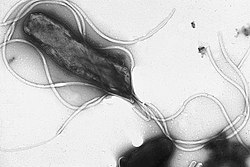Helicobacter pylori
Helicobacter pylori (H. pylori) is a spiral shaped bacterium that lives in or on the lining of the stomach. It causes more than 90 percent of ulcers, which are sores in the lining of the stomach or the duodenum (the first part of the small intestine). Before 1982, when this bacterium was discovered, doctors thought that spicy food, acid, stress and lifestyle caused most ulcers. Because doctors now know that most ulcers are caused by an H. pylori infection, they can be cured with the correct antibiotics.
| Helicobacter pylori | |
|---|---|

| |
| Scientific classification | |
| Kingdom: | |
| Phylum: | |
| Class: | Epsilon Proteobacteria
|
| Order: | |
| Family: | |
| Genus: | |
| Species: | H. pylori
|
| Binomial name | |
| Helicobacter pylori ((Marshall et al. 1985) Goodwin et al. 1989)
| |
Heliobacter pylori was first discovered by Australian scientists, Barry J. Marshall and J. Robin Warren. They won the Nobel Prize in Physiology or Medicine in 2005 for their work.
Other websites
| Wikispecies has information on: Helicobacter pylori. |
| Wikimedia Commons has media related to Lua error in Module:Commons_link at line 62: attempt to index field 'wikibase' (a nil value).. |